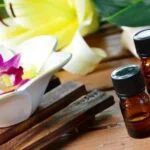
In today’s fast-paced and stressful world, getting a good night’s sleep can often feel like an elusive dream. As a result, people are continuously searching for natural remedies that can help them drift off to slumber peacefully. One such solution that has been gaining popularity is aromatherapy. Harnessing the power of scents, aromatherapy offers a holistic approach to promote relaxation and induce deep sleep.
Aromatherapy has been used for centuries as a therapeutic practice to support overall well-being. Its effectiveness in improving sleep quality is attributed to the direct influence scents have on our emotions and brain activity. In fact, certain essential oils contain compounds that interact with our nervous system, helping us feel calm, reduce anxiety, and ultimately prepare our bodies for restful sleep.
One of the primary benefits of using essential oils for sleep is their ability to alleviate common sleep disorders like insomnia or difficulty falling asleep. Unlike conventional sleep aids that may come with unwanted side effects or dependencies, aromatherapy provides a natural alternative. By incorporating these calming scents into your nightly routine, you can create a soothing environment that encourages deep relaxation and promotes optimal conditions for quality slumber.
By exploring the connection between scents and emotions through aromatherapy, it becomes clear that incorporating this practice into your sleep routine might hold the key to unlocking restorative nights of uninterrupted rest. In the following sections, we will dive deeper into the science behind aromatherapy and understand how specific essential oils can benefit your sleep patterns.
Furthermore, we will explore various methods of incorporating aromatherapy into your life and provide safety guidelines to ensure you maximize its potential without any adverse effects.
Sleep deprivation affects every aspect of our lives – from productivity and mood regulation to overall health. If you’re tired of restless nights and waking up feeling groggy or drained, it may be time to consider embracing the natural solution of aromatherapy for a restful sleep. So, let us embark on this journey and discover the transformative power of scents in promoting a peaceful slumber.
Understanding the Science Behind Aromatherapy
Aromatherapy has gained popularity as a natural sleep aid, but what exactly is the science behind it? The connection between scents and emotions plays a significant role in explaining how aromatherapy can promote relaxation and induce sleep.
Scents have a powerful effect on our emotions and can even trigger memories and associations. When it comes to sleep, certain aromas have been found to have calming and soothing effects on the mind and body. This is because of the link between our olfactory system (sense of smell) and the limbic system in our brain, which is responsible for emotional responses.
One important aspect of this connection is that when we inhale certain essential oils, they can directly affect our mood and emotions. For example, lavender oil is well-known for its relaxing properties. It has been shown to reduce anxiety levels, lower blood pressure, and promote better quality sleep. Other essential oils like chamomile, ylang-ylang, and bergamot also have similar calming effects.
Understanding this science allows us to harness the power of aromatherapy for better sleep. By choosing essential oils with specific properties that promote relaxation, we can create an environment conducive to falling asleep faster and experiencing more restful nights.
To experience the benefits of aromatherapy for sleep, it’s important to choose the right essential oils known for their sleep-promoting properties. Here are some examples:
- Lavender: Known for its calming effects and ability to reduce anxiety
- Chamomile: Promotes relaxation and aids in easing insomnia
- Sandalwood: Induces feelings of tranquility and enhances deep sleep
- Bergamot: Reduces stress levels and promotes relaxation
- Neroli: Soothes nerves and promotes peaceful sleep
Each essential oil has its own unique benefits and can be used either individually or blended together to create a personalized sleep-inducing blend. Experimenting with different oils and discovering what works best for you is key in finding the most effective aromatherapy routine for a restful night’s sleep.
Choosing the Right Essential Oils for a Good Night’s Sleep
When it comes to using aromatherapy for sleep, selecting the right essential oils is crucial. Each essential oil possesses unique properties that can promote relaxation, calm the mind, and induce sleep. Here are several essential oils known for their sleep-promoting properties and the specific benefits they offer:
- Lavender: Widely recognized for its calming effects, lavender essential oil can help alleviate anxiety and stress, making it easier to fall asleep. It is also believed to improve overall sleep quality and increase deep sleep.
- Chamomile: Known for its soothing qualities, chamomile essential oil can help reduce insomnia symptoms and improve sleep quality. It has a gentle floral scent that promotes relaxation and tranquility.
- Vetiver: With its earthy and grounding aroma, vetiver essential oil is highly effective in calming an overactive mind at bedtime. It aids in reducing feelings of restlessness or racing thoughts, facilitating a deeper and more restful sleep.
- Ylang Ylang: This sweet-floral scented essential oil is renowned for its ability to promote relaxation and reduce stress levels. Ylang ylang can create a serene atmosphere that makes falling asleep easier.
- Bergamot: Possessing a fresh citrus scent, bergamot essential oil helps alleviate symptoms of anxiety and depression that may interfere with sleep. It provides a sense of upliftment while inducing relaxation.
- Cedarwood: Cedarwood essential oil offers a woody aroma known for its sedative properties, encouraging a peaceful environment conducive to better sleep quality.
- Frankincense: A resinous oil with a rich and warm scent, frankincense promotes deep breathing and calms the nervous system, allowing for improved relaxation before bed.
- Marjoram: Often referred to as “the herb of happiness,” marjoram essential oil helps ease muscle tension, reduce anxiety, and promote a sense of calm for a good night’s sleep.
To maximize the effectiveness of essential oils, it is recommended to use high-quality, therapeutic-grade oils. This ensures that the oils retain their natural properties and are free from synthetic additives. Additionally, it’s important to note that individual preferences may vary, and what works for one person may not work for another. Experimenting with different essential oil combinations can help find the perfect match for achieving a peaceful slumber.
| Essential Oil | Benefit |
|---|---|
| Lavender | Calming effects, reduces anxiety and stress |
| Chamomile | Soothing qualities, improves sleep quality |
| Vetiver | Grounding aroma, calms an overactive mind |
| Ylang Ylang | Promotes relaxation and reduces stress levels |
| Bergamot | Reduces anxiety and depression symptoms |
By carefully selecting the right essential oils based on their specific benefits and personal preferences, individuals can harness the power of aromatherapy to enjoy a restful night’s sleep.
Different Methods of Incorporating Aromatherapy into Your Sleep Routine
Aromatherapy offers various methods for incorporating its benefits into your sleep routine. By exploring different techniques, individuals can enjoy the relaxing and sleep-enhancing properties of essential oils before bedtime. Here are some effective ways to incorporate aromatherapy into your sleep routine:
- Diffusers: A popular method of enjoying the benefits of essential oils is through diffusers. These devices release a fine mist of oil particles into the air, allowing you to breathe in the aroma while you sleep. Diffusers come in different types, such as ultrasonic diffusers that use water or nebulizing diffusers that disperse pure essential oils without water.
- Massage Oils: Another way to incorporate aromatherapy into your sleep routine is by using massage oils. Mixing a few drops of essential oil with a carrier oil (such as coconut or jojoba oil) creates a soothing blend that can be applied directly to the skin during a gentle self-massage or used by a partner in a full-body massage.
This method not only helps promote relaxation but also allows for gentle absorption of the oils into the body. - Pillow Sprays: Creating DIY pillow sprays with essential oils can be an effective way to enhance your sleeping environment. Simply combine a few drops of your chosen essential oil with water in a spray bottle and lightly mist it onto your pillow and bedding before going to bed. The calming scent will help create an atmosphere conducive to falling asleep and staying asleep.
- Bath Soaks: Taking a warm bath before bed can already promote relaxation, but adding essential oils to the mix takes it to another level. Add a few drops of soothing essential oils to Epsom salts or carrier oil, then add them to your bathwater for an aromatic and luxurious soak before bedtime. The warmth of the water will help release the aroma and allow it to envelop you as you unwind.
| Method | Description |
|---|---|
| Diffusers | A popular method that releases essential oil particles into the air for inhalation. |
| Massage Oils | A soothing blend of essential oils and carrier oils that can be applied directly to the skin during self-massage or a full-body massage. |
| Pillow Sprays | An easy DIY method of misting a blend of essential oils and water onto pillows and bedding to create a calming sleep environment. |
| Bath Soaks | Enhancing a warm bath with essential oils for a relaxing and aromatic soaking experience before bed. |
Creating a Relaxing Sleep Environment with Aromatherapy
One of the key factors in achieving a restful sleep is creating a relaxing sleep environment. Incorporating aromatherapy into your sleep routine can play a significant role in setting the stage for a peaceful and rejuvenating slumber. Here are some tips on how to create a serene atmosphere in your bedroom using aromatherapy:
- Choose calming essential oils: When selecting essential oils for your sleep environment, opt for scents that promote relaxation and tranquility. Lavender, chamomile, bergamot, and ylang-ylang are all excellent choices known for their calming properties. These oils can help calm the mind and prepare your body for sleep.
- Utilize diffusion: A popular way to enjoy the benefits of aromatherapy is through the use of diffusers. Diffusers disperse essential oils into the air in fine particles, allowing you to breathe them in easily. Place a diffuser near your bed or in a central location in your bedroom and let the soothing aroma fill the space.
- Experiment with pillow sprays: Another effective method of incorporating aromatherapy into your sleep environment is by using pillow sprays. These sprays typically consist of water mixed with a few drops of essential oil and can be lightly misted onto your pillow or bedding before sleep. The aroma will surround you as you drift off, enhancing relaxation.
In addition to aromatherapy, there are other elements you can incorporate into your sleep environment to enhance its effectiveness:
- Calming music: Playing soft, gentle music or nature sounds can further contribute to a relaxing atmosphere in your bedroom. Choose soothing melodies or instrumental tracks that help calm the mind and promote relaxation.
- Dim lighting: Creating a dimly lit environment signals to your body that it’s time to unwind and prepare for sleep. Use bedside lamps with warm-toned bulbs or invest in adjustable lighting options that allow you to customize the brightness in your bedroom.
By incorporating these elements into your sleep environment, you can enhance the effectiveness of aromatherapy and create an atmosphere conducive to a restful night’s sleep. Experiment with different scents and techniques to find what works best for you and enjoy the benefits of a more peaceful slumber.
Aromatherapy Recipes and Blends for Better Sleep
Incorporating aromatherapy into your sleep routine can be as simple as creating your own sleep-inducing blends using essential oils. By combining different scents, you can tailor the blend to suit your personal preferences and needs. Here are some easy-to-follow recipes for DIY aromatherapy blends that can help improve your sleep quality:
1. Lavender and Chamomile Blend:
- 10 drops of lavender essential oil.
- 5 drops of chamomile essential oil.
- 2 tablespoons of a carrier oil (such as sweet almond or jojoba oil).
Mix the essential oils with the carrier oil in a small glass bottle. Shake gently to blend them together. Before bed, massage a few drops of this blend onto your temples, wrists, and chest. The calming properties of both lavender and chamomile will promote relaxation and prepare your mind for a restful sleep.
2. Sweet Orange and Bergamot Blend:
- 8 drops of sweet orange essential oil.
- 4 drops of bergamot essential oil.
- 1 tablespoon of distilled water.
Combine the essential oils with the distilled water in a small spray bottle. Shake well to ensure they are thoroughly mixed together. Spritz this blend onto your pillow before bedtime to enjoy the uplifting aroma of sweet orange combined with the soothing scent of bergamot. This blend helps alleviate stress and anxiety, allowing you to drift off into a peaceful slumber.
3. Vetiver and Cedarwood Blend:
- 6 drops of vetiver essential oil.
- 6 drops of cedarwood essential oil.
- A handful of Epsom salt.
Add the vetiver and cedarwood essential oils to a bowl filled with Epsom salt. Mix well until the salt is evenly coated with the oils. Sprinkle this blend into warm bathwater just before getting in for a soak. The grounding and earthy aroma of vetiver and cedarwood will help calm a busy mind and prepare your body for a deep sleep.
Remember, when creating your own blends, it’s important to respect the potency of essential oils. Start with a lower number of drops and gradually increase if needed. Experiment with different combinations until you find the blend that works best for you.
Instructions for Mixing Essential Oils
When mixing essential oils for sleep blends, it’s crucial to follow proper measurements and guidelines to ensure safe usage:
- Dilution Ratio: Typically, a 2% dilution ratio is recommended for adults when blending essential oils. This means using approximately 12 drops of essential oil per 1 ounce (30 mL) of carrier oil or other base ingredients.
- Patch Test: Before using any new blend topically, perform a patch test on a small area of skin to check for any adverse reactions or sensitivities.
- Storage: Store blended oils in dark glass bottles away from heat and direct sunlight to maintain their potency and longevity.
- Choosing Quality Oils: To maximize the therapeutic benefits of aromatherapy, opt for high-quality essential oils sourced from reputable brands.
Creating your own custom blends not only allows you to tailor the aromatherapy experience to your preferences but also gives you complete control over the ingredients used in your sleep routine. Whether you prefer floral scents like lavender or woody notes like cedarwood, there is a perfect combination waiting to be discovered by you.
Aromatherapy Safety Precautions and Tips
Understanding Potential Allergic Reactions and Sensitivities
While aromatherapy can be a powerful tool for promoting sleep, it is important to remember that essential oils are highly concentrated substances. Some individuals may experience allergic reactions or sensitivities to certain oils, so it’s crucial to proceed with caution. Before using any essential oil, it is recommended to perform a patch test on a small area of skin to check for any adverse reactions or irritation.
In addition, individuals with asthma or other respiratory conditions should be cautious when using essential oils. Strong scents can trigger breathing difficulties in some people, so it is best to start with very low concentrations and observe any potential effects.
Proper Usage and Dilution Ratios
When using essential oils for sleep, it is important to use them properly and to dilute them appropriately. Essential oils are highly concentrated, which means they should never be applied directly onto the skin without being diluted first. Diluting essential oils in a carrier oil such as sweet almond oil or grapeseed oil not only reduces the risk of adverse reactions but also helps spread the aroma more evenly.
It is generally recommended to stick to a dilution ratio of 2-3% for adults and 1% for children when using essential oils topically. This means adding about 12-18 drops of essential oil per ounce of carrier oil for adults and 6 drops per ounce of carrier oil for children.
Contraindications for Specific Medical Conditions
Certain medical conditions may require extra caution when using aromatherapy. For example, pregnant women should consult their healthcare provider before incorporating new essential oils into their routine due to possible risks to the fetus.
Some essential oils may also interact with medications or exacerbate specific health conditions. Individuals who have epilepsy or high blood pressure should consult their healthcare provider before using certain essential oils known to potentially trigger seizures or raise blood pressure levels.
Overall, it is important to remember that while aromatherapy can be a safe and effective natural sleep aid, it is always wise to educate oneself on the proper usage and potential contraindications of essential oils. Consulting with a healthcare professional or aromatherapist is recommended when in doubt about incorporating aromatherapy into your sleep routine.
Additional Sleep-Enhancing Techniques to Combine with Aromatherapy
While aromatherapy can be a powerful tool for improving sleep, it is often most effective when combined with other sleep-enhancing techniques. By incorporating additional practices into your bedtime routine, you can further enhance the benefits of aromatherapy and promote a more restful slumber.
One complementary technique that pairs well with aromatherapy is meditation. Practicing meditation before bed can help calm the mind and relax the body, making it easier to fall asleep. You can incorporate aromatherapy by diffusing a calming essential oil like lavender or chamomile during your meditation practice. The scent can help deepen your relaxation and create a soothing atmosphere conducive to achieving a peaceful sleep.
In addition to meditation, practicing good sleep hygiene is another important technique to improve sleep quality. This involves establishing a consistent sleep schedule, creating a comfortable sleeping environment, and avoiding stimulating activities or substances before bed. Incorporating aromatherapy into your sleep hygiene routine can further enhance its effectiveness. For example, you could use an essential oil-infused pillow spray on your bedding each night or add a few drops of relaxing oil into your bathwater before soaking in it.
Furthermore, engaging in stress-reduction exercises such as deep breathing or progressive muscle relaxation can complement the calming effects of aromatherapy. These techniques help release tension from the body and quiet the mind, allowing for a more peaceful transition into sleep. By incorporating essential oils that promote relaxation, such as bergamot or ylang-ylang, you can further enhance the effectiveness of these stress-reduction exercises.
Personal Experiences and Success Stories with Aromatherapy for Sleep
Aromatherapy has gained significant popularity as a natural sleep aid, with many individuals sharing their personal experiences and success stories. These testimonials provide valuable insights into the effectiveness of aromatherapy for improving sleep quality and promoting relaxation.
One individual, Sarah, had been struggling with insomnia for years before discovering the benefits of aromatherapy. She decided to give it a try after hearing about the calming effects of lavender essential oil.
Sarah started using a lavender pillow spray before bed and noticed an immediate difference in her ability to fall asleep and stay asleep throughout the night. The soothing aroma helped to quiet her mind and create a sense of tranquility, allowing her to drift off into a restful slumber.
Another success story comes from Michael, who often experienced restless nights due to stress and anxiety. He began incorporating aromatherapy into his bedtime routine by using a diffuser with chamomile essential oil. The gentle scent of chamomile helped to relax his mind and body, easing his anxious thoughts and helping him unwind before sleep. Michael found that he woke up feeling more refreshed and rejuvenated after incorporating this simple aromatherapy practice into his nightly routine.
These personal experiences mirror the growing body of scientific evidence supporting the use of aromatherapy for improving sleep quality. Studies have shown that certain essential oils can promote relaxation, reduce stress, decrease heart rate, and enhance feelings of calmness – all important factors in achieving a restful night’s sleep.
It is important to note that while many individuals find great success with aromatherapy for sleep, results may vary from person to person. It is always recommended to consult with a healthcare professional before starting any new treatment or if you have any underlying health conditions.
Overall, these personal experiences highlight the power of aromatherapy as an effective natural solution for better sleep. By harnessing the relaxing properties of essential oils like lavender and chamomile, individuals can create a peaceful environment conducive to rest and rejuvenation. As more people continue to share their success stories, the popularity of aromatherapy for sleep is only expected to grow.
Conclusion
In conclusion, aromatherapy is a powerful and natural solution for achieving restorative sleep. Through the use of essential oils, individuals can tap into the benefits of scents that trigger relaxation and induce sleep. By choosing the right essential oils, incorporating various methods of application, and creating a relaxing sleep environment, individuals can enhance the effectiveness of aromatherapy in their sleep routine.
One of the key takeaways from this article is the importance of creating a serene atmosphere in the bedroom. By combining aromatherapy with elements like calming music and dim lighting, individuals can further enhance the effects of aromas on relaxation and sleep. Additionally, it is crucial to follow safety precautions and guidance on proper usage to ensure that aromatherapy is used safely and effectively.
Furthermore, incorporating complementary practices such as meditation, sleep hygiene tips, and stress-reduction exercises can amplify the benefits of aromatherapy. These practices work hand in hand with the soothing scents to create an optimal environment for quality sleep.
Frequently Asked Questions
Does aromatherapy actually work for sleep?
Aromatherapy has been used for centuries as a natural remedy to promote relaxation and sleep. While there isn’t concrete scientific evidence to prove its effectiveness in improving sleep, many individuals report positive experiences with aromatherapy for sleep.
Certain essential oils, such as lavender or chamomile, are believed to have calming properties that can help ease the mind and induce a sense of tranquility, potentially aiding in falling asleep faster and experiencing better quality sleep.
How do you use aromatherapy for sleep?
To use aromatherapy for sleep, there are various methods available. One popular approach is using an essential oil diffuser, which disperses aromatic molecules into the air. Simply add a few drops of your chosen sleep-inducing essential oil (such as lavender) into the diffuser along with water, then turn it on before going to bed.
Another option is applying diluted essential oils onto your skin through massage or using them in a warm bath before bedtime. Some people also find it helpful to put a few drops of essential oil onto a handkerchief or tissue and place it near their pillow while sleeping.
What scent helps you fall asleep?
Different scents work differently for each person when it comes to facilitating sleep. However, one scent that is commonly known to aid in falling asleep is lavender. The floral aroma of lavender has been extensively studied and shown to have calming effects on both the mind and body.
Research suggests that lavender may help reduce anxiety levels, slow down heart rate, and promote feelings of relaxation – all factors contributing to falling asleep more easily. Other scents frequently associated with promoting sleep include chamomile, ylang-ylang, bergamot, valerian, and sandalwood. Ultimately though, finding the right scent that helps you fall asleep is a personal preference as different individuals may respond differently to various aromas.




